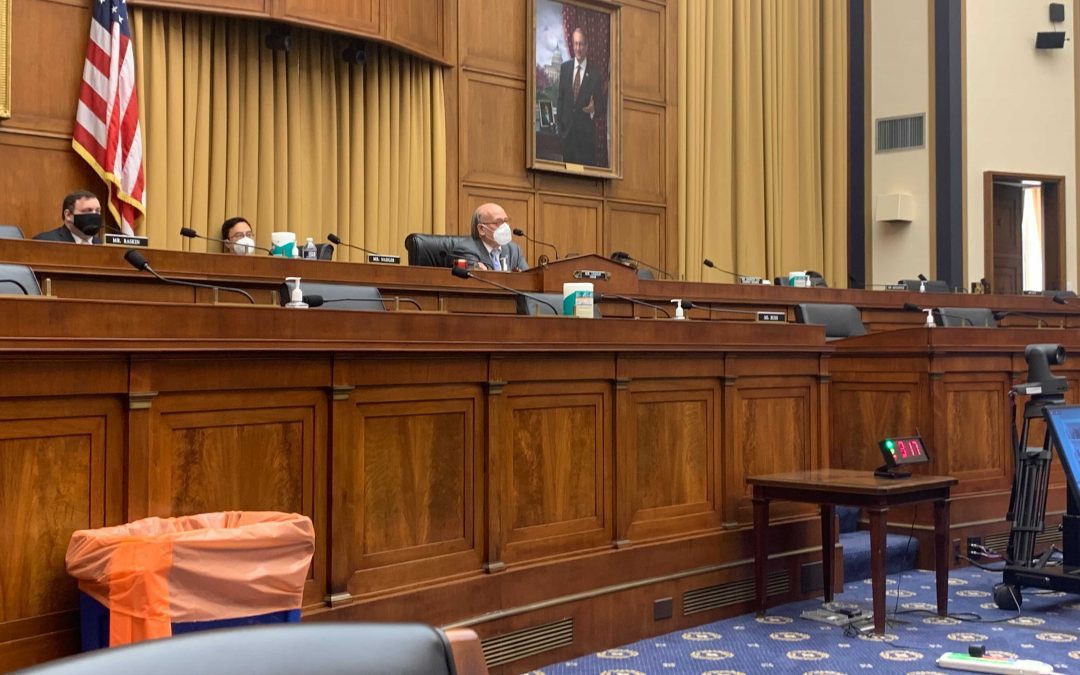WASHINGTON — Addressing some state and local governments’ failures to enforce the guidelines outlined by the Americans with Disabilities Act should be a priority for Congress, experts told lawmakers on Wednesday.
“While the ADA has helped break down hidden barriers facing people with disabilities, our nation has yet to achieve the law’s promise of full integration,” Rep. Jerry Nadler, D-N.Y., said during the Subcommittee on Constitution, Civil Rights and Civil Liberties’ oversight hearing on the ADA, which became law in 1990.
Experts offered suggestions for improving access to housing and employment and emphasized the pitfalls in voting access for people with disabilities, which has come under a new light during the COVID-19 pandemic and after the 2020 election.
“America’s polling places are woefully, inexcusably, unjustly out of compliance with the ADA,” said Michelle Bishop, voter access and engagement manager for the National Disability Rights Network.
While the pandemic brought about a shift in workplace culture and policies that lend themselves towards greater flexibility and accessibility through remote work, people with disabilities are not afforded the same opportunities, according to Regina Kline, founder and CEO of SmartJob LLC.
“People with disabilities remain among the most conspicuously unemployed and underemployed people in the United States and the world at the precise moment that the economy is showing signs of shifting into a golden era of flexible work,” Kline said.
People with disabilities, a constituency that includes nearly 1 in 5 Americans, comprise roughly half of those living in long-term poverty in the United States, according to the U.S. Census Bureau. In addition, the National Council on Disability says that nearly two-thirds of working-age people with disabilities are not employed.
Requirements for small business owners in providing public accommodation to people with disabilities are unclear and often ambiguous, said Karen Harned, executive director of the National Federation of Independent Business Small Business Legal Center.
“Many small business owners still struggle to understand when and what structural and online changes are required due to an enforcement that is primarily done through private lawsuits,” she said.
While ranking member Mike Johnson, R-La., said he believes ensuring integration for people with disabilities is “not a partisan issue,” Reps. Sheila Jackson Lee, D-Texas, and Hank Johnson, D-Ga., brought up instances they said demonstrated Republican policy agendas put disabled communities at risk.
“As of September 29th, Republican politicians in nine states have banned school districts from setting universal mask mandates,” Johnson said. “These bans make it more difficult for students with disabilities to return to in-person learning.”
Johnson also referenced the “unnecessary and primitive restrictions” on mail-in voting and accessibility to polling places recently introduced by Republican legislatures around the country.
“After Trump lost the 2020 election in a landslide, after the Big Lie and the insurrection, the right to vote has once again come under relentless assault in states led by Republican politicians looking to remain in power despite demographic shifts occurring throughout the nation,” he said.
Lee added that one of these voter restriction bills, Texas’s Senate Bill 8, “is not an election bill, it is a ‘prohibition of election’ bill.”
Johnson said he doesn’t think most Americans truly understand “the extraordinary efforts” that disabled voters must take to exercise their fundamental right to vote.
There were 38.3 million people with disabilities eligible to vote in the United States, one-sixth of the total American electorate during the 2020 Election, according to a projection from the School of Management and Labor Relations at Rutgers University.
However, only 40% of the polling places in the 2016 election had an accessible path of travel, defined as from parking to the voting station, said the United States Government Accountability Office.
At the hearing, experts said that the problem does not lie in the ADA itself, which consists of extensive and comprehensive mandates and provisions, but in the poor execution and enforcement of the law.
“We need not do anything to the ADA, other than vigorous enforcement,” Kline said. “It’s really a matter of supporting state and local governments to comply, supporting the Department of Justice to vigorously enforce the mandates, and providing clear, unequivocal guidance on how to do so.”
Lee called living in America with a disability a “crisis” and pointed to the racial and ethnic disparities faced by marginalized communities in special education programs.
“The disabled community is with us,” she said. “And they deserve the ultimate quality of life that we, as part of this democratic republic, must ensure they get.”

